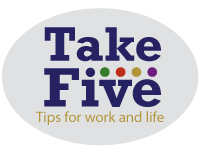Take Five: Tips For Dealing With Conflict
Duke provides resources to help faculty, staff deal with difficult work situations
Difficult situations arise everywhere - at home, with friends and at work. That's why Duke has a variety of resources to help faculty and staff deal with difficult work situations like disagreements with colleagues. What counts most is how issues are handled.
"With 30,000 employees at Duke, it goes without saying that conflict with co-workers occurs," said Dexter Nolley , director of Staff and Labor Relations. "The impact of conflict in the workplace can be debilitating to all parties involved, so it's how we handle those problems that are important."
Read MoreUse these tips to make positive changes from negative situations.
1. Stay calm and get perspective
The most important thing to do when facing a conflict is to step back and assess the situation, Nolley said. Remember what's important and the mission of what you and your co-workers are trying to accomplish. Workplace problems have the ability to decrease productivity, increase mistakes because of distractions or create a less efficient workspace.
"Situations where co-workers are in conflict could bring about positive change for the organization, if handled appropriately," Nolley said. "Conflict is inevitable in any workgroup, but conflict does not have to destroy the workgroup."
2. Treat the co-worker with respect
Addressing problems can be as easy as following "The Golden Rule" of treating others how you'd want to be treated. Robert Crouch , cross-cultural relations specialist with the Office for Institutional Equity, said Duke faculty and staff can go one step further.

"I like to call it the `Platinum Rule,' because not everyone likes things done for them as we like to do for ourselves," he said. "It's as simple as treating people how they want to be treated by being respectful to their personal ideas and emotions."
3. Communicate your thoughts and feelings
The ability to solve problems is rooted in communication, Crouch said. He added that being thoughtful and honest while communicating with co-workers can go a long way. Much like the idea that honesty is the best policy, telling the truth instead of sugar-coating feelings is the best and quickest way to fully address a problem and come up with a solution.
4. Focus on what can be acted upon
By letting workplace problems linger, employees can become distracted from main responsibilities or avoid each other all together. That's why tackling problems one-at-a-time can be helpful.
"Co-workers may seek out alternative and less efficient ways to get work accomplished just to avoid a negative interaction," Nolley said. "Try solving small problems first, as they can point the direction to alleviating bigger issues."
5. Seek resolution with a third party
If solving a problem within an office becomes too difficult, Duke offers formal and informal mediation through Staff and Labor Relations and Personal Assistance Service (PAS). PAS provides confidential voluntary assessments, short-term counseling and referrals for a range of personal, family and work problems.
Crouch said asking for outside help shouldn't be seen as a negative alternative because sometimes it can create stronger communication channels among co-workers.
"Communication is so very important because it's easy to fail in resolving a conflict by not taking the step forward and initiating a conversation," he said. "If needed, Duke has options to help create positive outcomes."